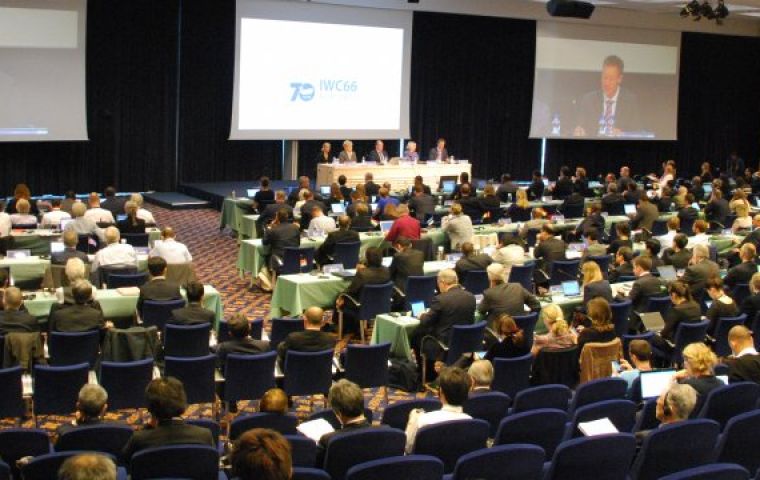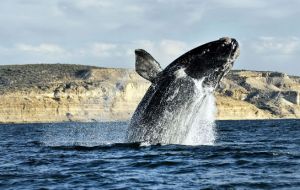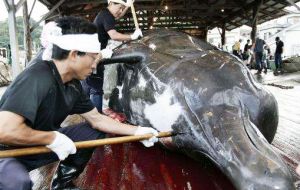MercoPress. South Atlantic News Agency
Japan and South Atlantic sanctuary main contentions at the Whaling Commission meeting in Slovenia
 Hunting nations Japan, Norway and Iceland are traditionally pitted against much of the rest of the world at the biennial IWC meetings
Hunting nations Japan, Norway and Iceland are traditionally pitted against much of the rest of the world at the biennial IWC meetings  Argentina, Brazil, Gabon, South Africa and Uruguay, depend on whale-watching tourist dollars and thus the South Atlantic Whale Sanctuary.
Argentina, Brazil, Gabon, South Africa and Uruguay, depend on whale-watching tourist dollars and thus the South Atlantic Whale Sanctuary.  In the 2014-15 season, Japan caught 90 Sei, 25 Bryde’s and 81 minke whales — a total of 196 for the year.
In the 2014-15 season, Japan caught 90 Sei, 25 Bryde’s and 81 minke whales — a total of 196 for the year.  The meat ends up on supermarket shelves and in restaurants, in line with an IWC stipulation that whales taken for science must be eaten.
The meat ends up on supermarket shelves and in restaurants, in line with an IWC stipulation that whales taken for science must be eaten. Representatives from more than 80 nations will square off in Slovenia this week over the fate of the world’s remaining whales as hunters, ship strikes and fishing gear threaten their survival. The stage is set for heated debate, as the 88 members of the International Whaling Commission are deeply divided along pro- and anti-hunting lines.
The biggest bones of contention are Japan’s yearly whale hunt in the name of science, which critics insist is for dinner tables instead, and a proposal for a South Atlantic sanctuary to protect the majestic marine mammals.
Hunting nations Japan, Norway and Iceland are traditionally pitted against much of the rest of the world at the biennial IWC meetings, which seek to balance issues of national sovereignty, subsistence rights and culture with conservation of Earth’s natural bounty. For environmentalists, it is an issue of cruelty as well.
“Whaling has no place in the 21st century. It’s outdated, it’s thoroughly inhumane,” Claire Bass of Humane Society International said from the Adriatic coastal town of Portoroz, where the commission’s 66th meeting will take place from this Monday to Friday. “There is no humane way to kill whales at sea,” she said, pointing out that many die long drawn-out deaths from horrific wounds inflicted by harpoons with explosive tips.
This year’s meeting marks the 70th anniversary of the commission’s founding, and the 30th birthday of a whaling moratorium estimated to have prevented the killing of tens, even hundreds, of thousands of whales.
The moratorium is credited with allowing many whale populations to recover after being hunted to near-extinction in the 20th century for meat and blubber used to make soap and fuel.
The only commission-sanctioned way to catch whales is with an aboriginal subsistence whaling license — issued to indigenous communities in North America, Russia, Greenland, and the Caribbean nation of St. Vincent and the Grenadines.
Japan sets its own quotas for what it says are scientific hunts, while Norway and Iceland do commercial hunts under legal loopholes.
Since 1985, according to the latest IWC figures, 16,235 whales have been hunted for science, 24,381 for commerce, and 10,139 under aboriginal subsistence permits. In the 2014-15 season, Japan caught 90 Sei, 25 Bryde’s and 81 minke whales — a total of 196 for the year. The meat ends up on supermarket shelves and in restaurants, in line with an IWC stipulation that whales taken for science must be eaten.
The International Court of Justice ruled in 2014 that Japan was abusing the scientific exemption. Tokyo cancelled its 2014-15 hunt, only to resume it the following year, killing an estimated 300-plus animals.
On this week’s agenda is a proposal by Australia and New Zealand for a rigorous process to review scientific whaling proposals and programs.
Another divisive issue on the agenda is a proposal by Argentina, Brazil, Gabon, South Africa and Uruguay — countries which depend on whale-watching tourist dollars — to create a 20-million-sq.-km (nearly 8-million-sq.-mile) South Atlantic Whale Sanctuary.
The bid — which requires a 75%t majority to pass — has failed at several previous meetings. During the 20th century, the vast majority of whaling took place in the Southern Hemisphere, and many populations are still recovering, observers say.
“The creation of (a) South Atlantic Whale Sanctuary would be a huge milestone for whale protection,” said Greenpeace whale expert John Frizell. “With the multitude of problems facing these magnificent creatures, they need healthy oceans and they certainly do not need a return to commercial whaling.”
Anti-whaling nations and conservation groups will push hard for projects to reduce fisheries by catch, which kills an estimated 300,000 whales, dolphins and porpoises every year.




Top Comments
Disclaimer & comment rules-

-

-

Read all commentsScientific hunts ! What a load of balls. They hunt them to sell as food but pretend otherwise.
Oct 25th, 2016 - 07:48 pm +1I never thought that I would agree with Argentina but the setting -up of a sanctuary has my vote.
Agreed, Argentina are right on this.
Oct 27th, 2016 - 01:54 pm +1Should have a “friendly competition” between UK, US and Russian submarines, everyone enters one boat, who can sink the most whaling ships (tonnage wise) during the season.
Oct 25th, 2016 - 03:23 pm 0Holiday in Hawaii whale watching, or anything else you fancy, for the winning crew.
Commenting for this story is now closed.
If you have a Facebook account, become a fan and comment on our Facebook Page!